A Most Prolific Platinum Producer and Mixer: Rich Costey Revealed
Rich Costey has a dilemma: Let his GRAMMY-winning career as a producer and mixer speak for itself, or shed his shyness and do some of his own talking?
It’s understandable why Costey has gone with the former option for most of his professional life—the man is busy. When you visit his official discography page, you better have some time to take it all in, reflecting an incredible spread of influential artists: Muse, Foo Fighters, Fiona Apple, Jane’s Addiction, The Mars Volta, Chvrches, Jurassic 5, Rage Against the Machine, Major Lazer, Death Cab for Cutie, SWMRS, and more and more and more.
What has kept Costey in this perpetually prolific state? No doubt there’s an intense work ethic powering it all. His studio career started in 1992, then got a power up when he moved from Boston and the Berklee College of Music to New York City in 1995, where he went from new recruit to head engineer within six months at Philip Glass’ famed Looking Glass studio. A relocation to Los Angeles took things next level, where collaborations with mentor Jon Brion and Rick Rubin helped put him fully on the map.
With almost three decades of mixing, production and programming—and plenty of platinum—under his belt, Costey’s M.O. has mainly been to simply drive ahead, and eschew the hype. But as he keeps getting better and better, the studio maestro is finding he’s increasingly OK with talking about his trade. In this Q&A with SonicScoop, Costey kicks off 2020 with fresh revelations on successful multitasking, secretive dealings with Death Cab for Cutie, fear of console commitment, his simple tip for achieving a big mix, and why now is the right time for him to open up about all this.
Rich, anyone would envy the discography you’ve built up as an engineer, mixer, producer, and programmer since your first credit for the Swirlies in 1992, going straight through to today—there’s way too many influential artists to list. Is there a common thread among the artists who choose to work with you?
I think it depends on the role that I’m being asked to do. If I’m being asked to mix, then it’s probably somebody who is just attracted to other things that I’ve worked on and feels like I would be a good steward for their production.
If it’s somebody who calls me to produce, then I think that often—I’ve heard this from artists occasionally—that when I go in to work with them, I tend to turn the cart over on them a little bit and try to steer them into some new directions.
So, I like to feel like that might be somewhat of a common thread: If I’m producing an act who has made a bunch of records, then the first record I do with them usually sounds pretty different to whatever they’ve done previously.
A lot of producers—emerging to fully established—might be asking themselves, “What’s a technique for steering people towards something that you hear that you think might be right but they don’t hear it yet?” How can you get them there?
I usually start by just listening to a lot of music together. We’ll listen to a lot of music of other artists throughout the process and try to open up their expectations and notions of what’s possible in music, maybe turn them onto things they haven’t listened to.
A lot of people, they’re in a super busy cycle and they actually aren’t even listening to that much new music. Some acts will surprise you and they’ll be listening to a lot of music all of the time, but a lot of times their band is a big business, and they have to spend a lot of time thinking about it. So, we’ll sit and listen to a lot of music. It might be old music, or new music, just things that I feel like can help expand the horizon of where we could go with whatever it is that they’re doing.
That’s one way to do it, and the other way is just to try to show them. One of the key things you have to have in the control room is a great amount of trust with everyone, and no judgment whatsoever. As soon as someone in the room gets the sense that they’re being judged then the vibe can go toxic and people close up, and you don’t want that.
So you want to have a situation where everyone feels open to what’s possible and I try to foster that whenever I can, however you get there. That’s why sometimes you just listen to music and hang out, or if someone’s got an idea you take the song down a different road. Even if you might think it’s not going to work you’ve got to support it and see what happens, because sometimes on your way to a road that you think is a dead end you might pass by something pretty interesting, and go back and pick that up.
Recording Without Limits
My first question was, “Is there a common thread among the artists who choose to work with you.” Now I want to flip that and ask you, “What’s the common thread among the projects that have proven the most memorable and formative to you?”
For me the ones that really stand out are the ones where there’s no judgment of the process, and to some degree no limits of where something can go. As soon as there’s some kind of limit, whether that’s brought in by a commercial consideration or sometimes it can be financial consideration, those things automatically put a bottleneck on the process and close things down.
A pretty formative album for me was I worked on the second Fiona Apple album (1999’s When the Pawn…)as just an engineer and mixer, with Jon Brion producing.
There were no limits on that record at all. I mean, obviously she was coming off the back of a hugely successful debut album (1996’s Tidal), and we spent, I think, about 10 months working on that album. We would record completely different versions of different songs, we would use multiple drum sets on the same song even just to see what felt right. We’d revisit things from time to time, and I think through that process we ended up with something where there’s no way that album would have happened were we not given that freedom. There was no label checking in. Her manager started hearing stuff around the time that we were mixing it. So, there was no oversight other than just the creative people that were in the room, and those are generally my favorite kind of albums.
It sounds like that was a really satisfying project for you.
It was great on a lot of levels. We were in some of the best rooms in town, took as long as we wanted, and used a bunch of classic gear. And when you’re around people like Jon, and Matt Chamberlain, and Patrick Warren, and Fiona, you’ve got so many talents in the room—every day when you go to work you don’t really know what’s going to happen, and that’s super fun.
You got the opportunity to work with studio greats like Jon Brion and Rick Rubin, in those formative stages for you. What can you point to that you learned from producers like them, that you still carry with you today?
Kind of what we’ve been talking about already, like the idea of really letting something influence you in the room and not feeling limited, or I think in the case of Jon we would work without even necessarily knowing what the goal is. You would go through the process, experience it, see where it leads you and what you’re going to be inspired by from day to day.
One of the main things I learned from Rick Rubin is that…Coming into that relationship I think I listened in a much more intellectual fashion, having worked for Philip Glass for a few years and really been spending a lot of my time listening to contemporary classical music, and a lot of experimental electronic music. Rick listens far more instinctually and, and to me, he mostly listens only with his gut and with very little intellectual evaluation.
That was some real experience for me, because I mostly just mixed records for him. I’ve mixed a number of them over a few years including Rage Against the Machine’s last album “Renegades”, as well as the first Audioslave album, and you have to learn to listen the way he’s listening—that’s true whenever you’re mixing for any client. Rick would listen really loud once or twice and give you a whole pile of notes, and in order to try to decipher what it is that he’s hearing you learn to listen the way he’s listening.
He is always very instinctual, and if something seemed kind of complicated he would want to strip it down to get rid of all of the complications so that everything felt very direct. Every instrument, every element felt really direct, which was pretty different to the way I had been working, or even listening or approaching music. So I feel like I took a lot away from that relationship.
Mandatory Multitasking
I’m going to shift gears here. You’ve been serving multiple roles on projects pretty much from the start, looking at What To Do About Them by the Swirlies from 1992 your discography has you listed as producer, engineer, mixer, and programmer. What’s the appeal to you about taking on all of these tasks in the studio?
Well, I mean sometimes there’s not really an option to farm them out, but it’s also to me the programming is just part of the producing. I tend to like records that involve and always have involved some amount of electronics and that’s just part of what I do. I think most contemporary producers are no different in this respect.
Are there times where doing more actually becomes overwhelming and you just prefer to be focused on mixing or producing?
Yeah. I mean, that’s certainly the way my timeline tends to be split up is I’ll produce for a long chunk of time, and then I’ll start mixing and get on a mix run for a long chunk of time, and then I’ll go back to producing, and usually when you’re just mixing you’re very task specific. It’s not as creatively demanding day after day after day. It’s not to say that mixing isn’t creative, it’s just a different kind of thing.
So, yeah, I do enjoy the different disciplines. I almost always end up mixing my own records, with rare exceptions, and I think that’s probably just because I feel like I know how I want everything to sound, and so long as I don’t fuck up then everyone else is happy with it in the end.
A Changeup with Death Cab for Cutie
Drilling down to some specific projects, with Death Cab for Cutie and 2018’s Thank You For Today, I can’t imagine what a challenge it was to produce their first studio album without Chris Walla. What did that entail for you as a producer? How is that different from your experience working with them on Kintsugi from 2015?
With Thank You For Today it felt as though everyone was in the room together and working together in a way that wasn’t really the case on Kintsugi. On Kintsugi I didn’t know that Chris was leaving the band until long after the album was finished. The other guys in the band knew part way through the process, but they wisely didn’t tell anybody.
But Chris spent a lot of time in my B room and he would work on alternate versions of the songs, just weird programming stuff, like the chorus to “Black Sun,” that is literally taking the band version and then cutting pretty much straight to the weird remix that Chris was working on in the other room.
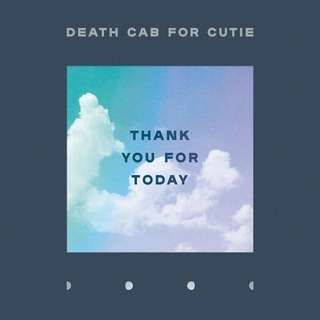
Producing, mixing and programming on Death Cab for Cutie’s “Thank You for Today” felt different to Rich Costey.
So, he would tend to be working on tangential ideas. He was doing that kind of process where you’re working on something and you don’t have a goal. He didn’t know if any of it was going to get used. And in so many examples that’s just the best way to work.
I would go in there and grab little bits of things, or reshape something, or then we’d work together on how to focus it. Whereas on Thank You For Today we were all in the same room together all of the time. That was much more of a band process, and in many cases the band were playing live. My studio is kind of like a large control room, and we’d put (drummer Jason) McGerr in a booth, and everyone else was in the same room. (Lead vocalist/guitarist) Ben (Gibbard) was singing without any headphones on. He was just listening to the studio loudspeakers.
So, weirdly, considering there’s two new members in the band, it was much more of a band album than Kintsugi was.
You said that they “wisely” did not tell you or anyone else that he was leaving the band for Kintsugi. Why was that a wise decision?
It was wise because I was unaware that there was really even much tension going on at all, and I pushed Chris as hard as I would anyone. I think there was one point where he felt like he was finished with his parts and flew back to Seattle, and I started going through everything and I felt like I needed more from him and made him come back down and spend another couple of weeks on that album, and he was totally cool with it.
We had a great time and we’re still friends, but I think had I known that he was bailing on the band I might have assumed that he wasn’t going to come back down and I wouldn’t have pushed him as hard as I did, but he was 100% in all of the time. There was no way for me to know that he was moving on after that record—he was completely committed to it.
Old Gear and New Sounds with SWMRS
Moving on to SWMRS, was their new album Berkeley’s On Fire as fun to produce and mix as it sounds like it was?
Yeah! That was a great fun making that record. I met with (brothers) Max and Cole (Becker) and they really struck me as super bright, had something to prove. I was on the phone with a lot of them and we talked about direction, and when we got in the studio the demos were pretty skeletal and it was another one of these situations where anything goes. It didn’t matter what we did. We could do anything and they were up for it, and to me that’s the cornerstone for making the right kind of album.
For most of the album we only recorded live kick, snare, and room, and the rest of the stuff we used ‘80’s drum machines to program it. In most cases we didn’t just sample it and then program it using a computer, we’d use the ‘80’s drum machine to program this beat because they have a very weird, stiff feel.
And there were small things like I didn’t want them to use any crash cymbals. Every single crash on the album is a sample. I think it’s all the same one actually. There’s like an 8-bit crash sample or something like that. And there’s another song called “Steve Got Robbed” where we sampled the guitar with an E-mu SP-1200, and then we used the SP-1200 to play the changes so we’re actually just pitching the chord using the SP— because the SP is obviously an old piece of gear it has a really peculiar sound when you pitch it.
There was a lot of going into that old technology, but we were also trying to make something that sounds new and not completely retro. That’s one of my favorite places to be. I like the idea of using older technology and even older sounds to try to make something new out of those pieces of technology. Not just doing something that’s reverential to the past, but just grabbing bits of gear and trying to do something with them that no one else is doing, or could do at the time really.
And what happens when you pull that off? Why is that a tool in your toolkit?
I think I like the collision of things that have a certain kind of familiarity and something that feels new at the same time. Matt Bellamy from Muse and I talk about this a lot. There’s an art movement called meta-modernism. It’s a collision of something with a generally historical cultural relevance and something contemporary, but instead of functioning as a pastiche, the pendulum swings back and forth so quickly that it creates something fresh. Film directors do this all the time and quite a few of my favorite artists, such as Lana Del Rey, also do this.
Since I’m a drummer, I wanted to ask what are the common threads between Joey Armstrong’s drumming and his famous father Billy Joe [of Green Day]? Where did you observe that they’re the same and where are they different?
The two bands are so different. I would think that there’s perhaps a distrust of authority from both of those bands. Joey was not distrustful of me but highly suspicious of any label involvement, and for a while he was suspicious of… I don’t think they were suspicious of having a producer, but once you’re in the room with them [suspicious of] anyone from the outside having anything to do with the process.
But past that I couldn’t say. He’s a great drummer, and his dad’s obviously a great musician as well.
“One of the Best Singers I’ve Ever Worked With”
There are so many bands in your discography I wanted to ask you about, but I had to keep it tight. My next question is, there seems to be something primal about the best of Iceland’s singers. What do you hear in Of Monsters and Men’s Nanna Bryndís Hilmarsdóttir, and what else makes Icelandic bands unique to you?
I think she’s one of the best singers I’ve ever worked with. She’s incredibly gifted. The whole band is terrific, but I think she is a unique case.
As far as the primal thing, I feel like when you spend a lot of time in Iceland you can’t escape nature. You can’t escape the fact that the daylight hours are changing from day to day, noticeably so. You can’t escape that the weather is coming after you in a big way. And Iceland, as anyone who has spent any time there will tell you, it doesn’t really get that cold in many regards, but it does get really fucking stormy.
So, I feel like there’s always a little bit of a sense that the Earth is kind of trying to kill you, and if you go back historically it was not an easy place to live. The notion that you’re kind of in a battle against natural forces is in their DNA there, and it tends to come out musically no matter what kind of song it is.
Hit Mixing Techniques
Focusing on mixing, your discography shows a mastery of mixing so many styles. How are you changing as a mixer? What’s different about the way you approach your craft now than from five years ago?
I think everyone to some degree is dealing with the fact that songs take a long time to be finished. Even if you think it’s finished, weeks or even months later somebody can you hit up needing a tweak of some type or another.
As a result you have to be a little more light on your feet. There are many solutions to that. Some people mix completely in the computer, some people use a hybrid situation. I haven’t been satisfied with my own mixing in the computer. I’ve had some satisfaction with a hybrid situation, but I’ve gone back to mixing on a console because I like the interface, but mostly just because I like the way it sounds.
What I’ve done now is I’ve minimized to some degree my hardware that I’m using, although I’m still using a fair bit, and then you do a lot of things in the computer before it makes it to the desk. So, for me that’s how I’ve adapted.
I’ve tried everything and was on an SSL Duality, but I’ve just recently installed an SSL 9048K from 2003. It was originally installed in Japan, I purchased it from the owner of Pacifique Studios in Glendale, where, among other things, the desk was used for mixing Beyonce’s “Lemonade” album.
I have had the Duality in my room for a couple of years, and I think it’s a very good console. But quite a lot of the console is designed around using it as a controller for Pro Tools or another DAW, and that’s just never going to happen for me. So, I went back to the K, which I’ve used a lot in the past and has a bit more headroom than the Duality.
It sounds like you got rid of the console for a while. Was it a Duality before? You went from Duality to control surface and then back to Duality, and now the 9048K?
Oh man! If you want to talk about consoles we’ll be here until next Thursday. Most people who are mixers have some success with some kind of console early on in their career and they just stick with it, and I have failed to do that. I tend to get a good run on a certain kind of console and develop a certain sound, and then eventually I’ll probe it and find some limit to something that I’m not happy with and then I’ll start thinking maybe I want to use a different desk, or a different studio.
Over time I’ve holed up with just about every console you can imagine, and as a result I’m pretty well acquainted with the strengths and weaknesses of pretty much ever mixing console you can think of.
What monitors are you listening to now?
I’ve used ATC’s for years. Once there was a period in the mid 2000’s when I moved back to New York that I felt like I needed something that was larger than what ATC had to offer at the time, so I tried a few different things out, but I’ve ended up back on ATC and I’m really happy there. I have ATC 50’s in my room with the sub, and then just Yamaha NS10’s, and that’s mostly it.
And then I’ve got a (Neve) BCM 10 (sidecar). I’ve lately been using the Manley Slam on the mix bus, along with I have a pair of EAR 660 tube compressor/limiters that I’ve used for probably 20 years on the mix bus and they still sound really good so they’re still there.
And then you’re recording into Pro Tools I take it?
Yeah. I like to use Logic when I’m producing because I feel like it’s more liberating. But when I’m mixing, I’ll mix out of Pro Tools, and I just got the new Apogee Symphony 2 converters, which I think sound amazing, so I’ve been really excited about them.
Talking about mixing, I did want to ask you about “Dead Boys” from Sam Fender because that seemed like a great song to hone in on. How did you approach mixing this track because there’s such a range of feels you had to handle in just 3:22. It’s nuanced, it’s subtle and fragile, and then there’s this big on rush of urgency, and a little denouement. How did you make that song feel cohesive from beginning to end?
You just give the track a bunch of headroom and let it go. There’s no trick to it. I think that if anything, my mixing trick is to not use that much stuff in the way of processing and plugins. I try to let the music speak, I guess that’s one way to put it. And so, for “Dead Boys” you just give it a good framework where it’s going to sound good and then get out of the way.
The Plain Truth About Career Longevity
Rich, we’ve talked so much about your successes and looking at your discography I would just assume that everything is great and it’s awesome to be Rich Costey 1000% of the time. But are there stressors that you face right now, and how do you handle them?
Well, even if you’re doing well in the music business everybody that I speak to no matter where they’re at—unless it’s Rick Rubin—there’s some amount of stress about the current state of the industry.
Or you’re basically going from project to project, and I think many people who are wildly successful often joke, “This record is the last one anyone is going to hire me for.” That sensation doesn’t ever really go away. Usually you still want to feel like you’re delivering something that you’re proud of, and the music business has a way of keeping people on their toes.
What’s your advice for emerging mixers and producers who want to be as busy as you are? What should they do?
Take every opportunity that you have, because you have no idea where any of these roads are going to go, or where they’re going to intersect with something else—even if it’s something that you’re not sure if you want to do, or if you can do it do it. Stay true to yourself as much as you can and be honest with people, and try to be sure about what it is that you like and what you’re doing and try not to worry about what other people are doing.
Here’s my last question: I get the impression that it’s important to you right now to talk about music production and mixing, and share your experiences with more people. Am I right? Why does it feel more important for you to do things like interviews?
Well, I’ve avoided this kind of stuff for years. I hardly ever do these kind of things for one reason or another, but I just feel like the time feels good to talk about these things.
I guess I feel secure with where I’m at in the world. I’m going to do some master classes at UCLA, I was speaking to the chairman of the music program over there and she was discussing with me what kind of information she thought her students wanted to know. The first thing out of her mouth was, “How do you maintain a career over a long period of time?”
Until then it hadn’t occurred to me that I’ve had a long career. But as soon as she said that I was like, “I guess I’ve been at this a while. Maybe I know something that’s worth sharing.”
- David Weiss
Please note: When you buy products through links on this page, we may earn an affiliate commission.







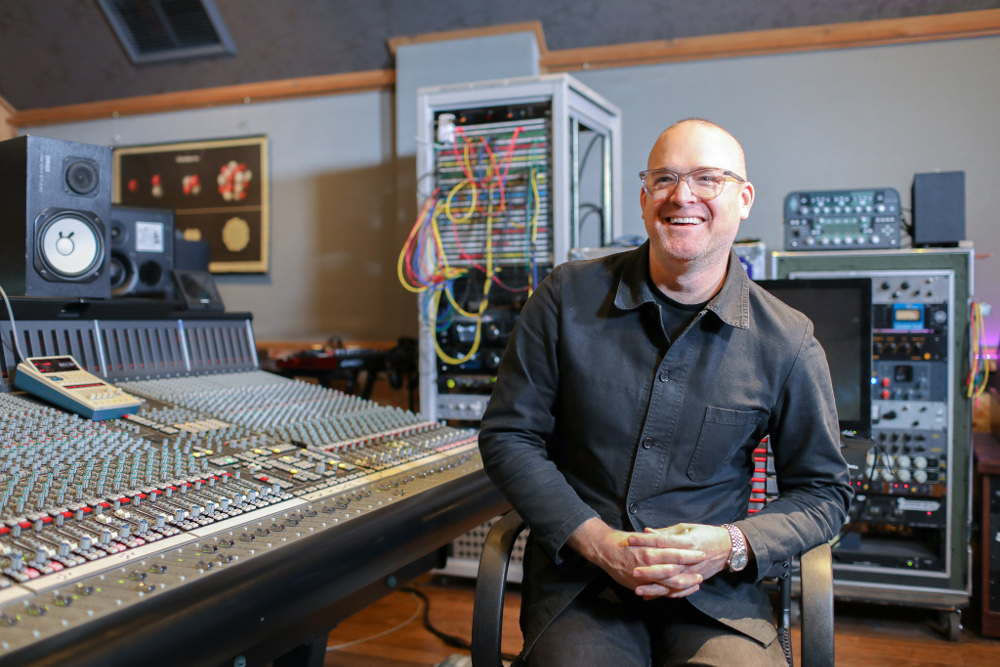
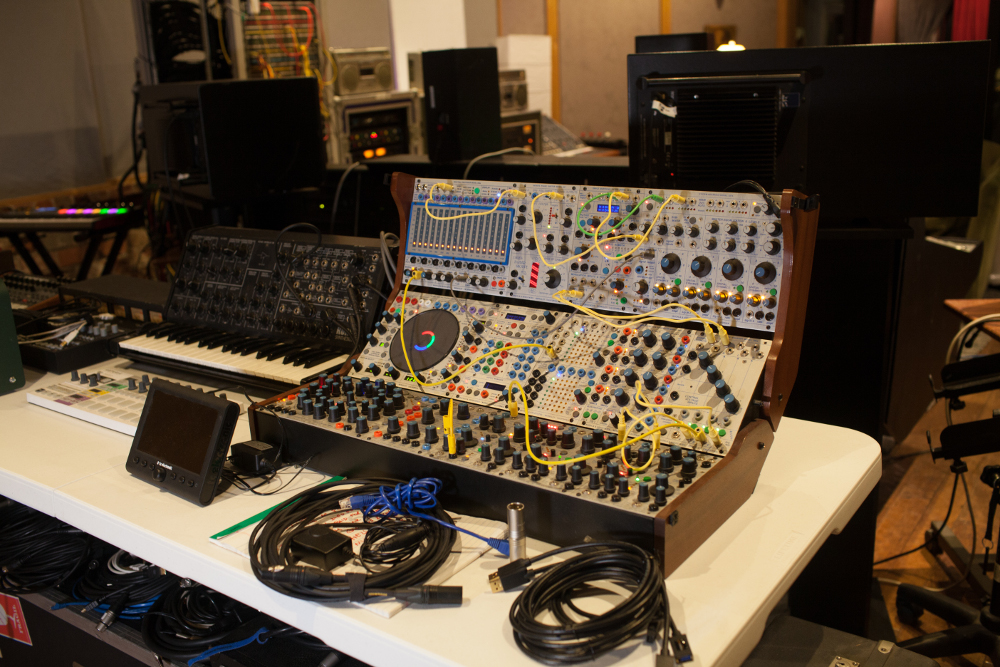
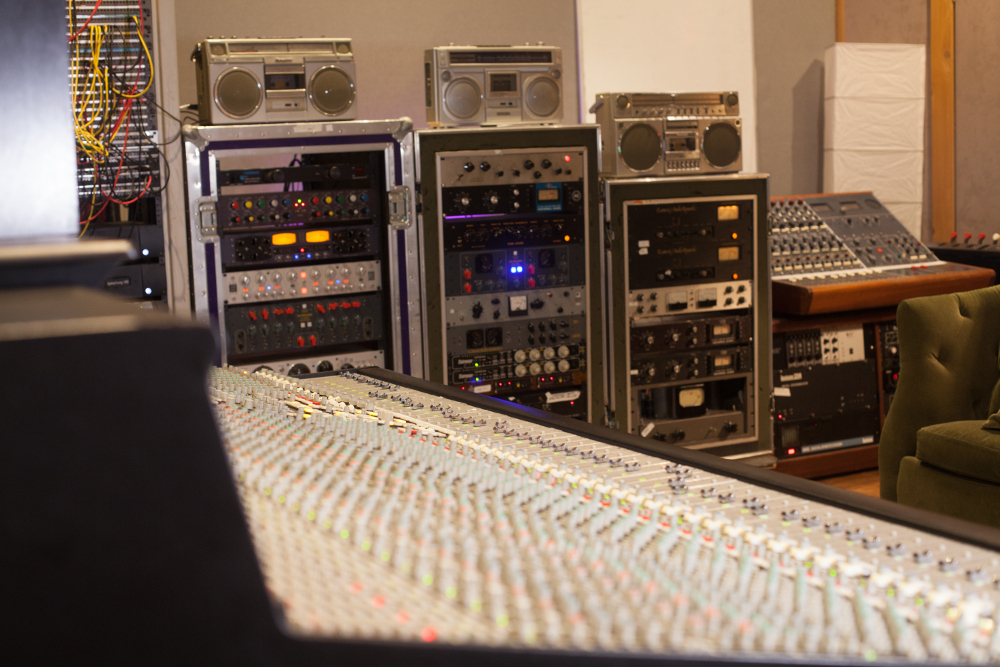
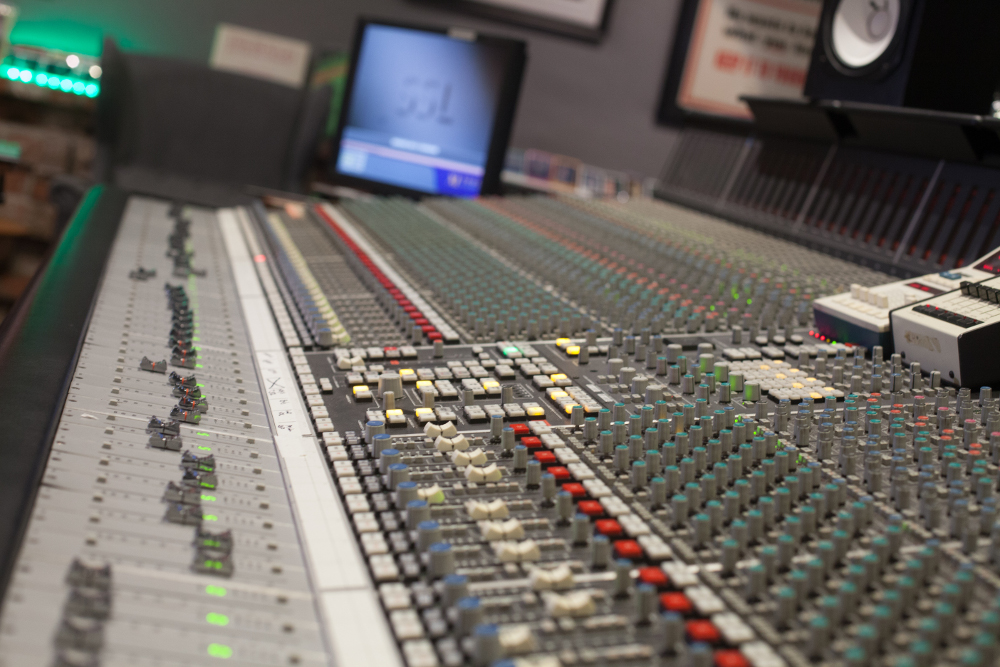
[…] It’s understandable why Costey has gone with the former option for most of his professional life—the man is busy. When you visit Read more… […]